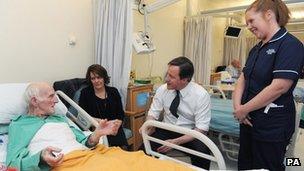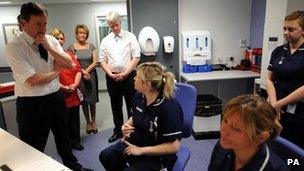Nursing standards: PM aims to tackle 'care problem'
- Published
- comments

David Cameron talked to patient Eric Cranston at Blackpool Victoria Hospital
Nurses have been told to do regular ward rounds, and patients encouraged to carry out inspections to improve hospital standards.
They are part of a package of measures announced by the prime minister for the English NHS to tackle what he sees as a "real problem" with patient care.
David Cameron told the BBC problems in some hospitals had been overlooked out of respect for the nursing profession.
This new move has come after a series of critical reports in the past year.
In November the Patients Association published a report containing 16 "shameful" stories about the care of elderly patients.
It included people being denied pain relief, left to sit in their own faeces and going without food and drink.
'A disservice'
The dossier was published just a month after the Care Quality Commission attacked hospitals for what the regulator said were "alarming" levels of care.
David Cameron says politicians have failed to "speak up" about the quality of nursing
The Health Service Ombudsman also raised concerns about the issue in February, reporting that nearly a fifth of complaints it got were related to the care of the elderly.
In each case, questions were raised about nursing standards because many of the basic failings - communication, nutrition, pain relief and assistance going to the toilet - fell under their remit.
Mr Cameron said he was "absolutely appalled" by these cases and they illustrated there was a "real problem" that needed to be put right fast.
In an interview with the BBC he went on to say: "Everyone in this country hugely respects what Britain's nurses do.
"But while we know the vast majority do a brilliant job there is clearly a problem in some hospitals in some settings where we are not getting the standards of care that the nation expects.
Howard Catton, Royal College of Nursing: "There are some areas where we have cut too many staff"
"Politicians frankly have done nurses a disservice by not talking about this. Such is our respect for nurses that we have almost hidden away concerns about this."
Mr Cameron said he had heard some "chilling" stories from his own constituents in Oxfordshire and now was the time to "speak up and act".
Denying the new initiative was a "gimmick" or that it was not his job to lead the debate on nursing standards, he added: "We have not had a public discussion about the issue and who better to do that than the prime minister?"
New regime
Central to his plan to tackle the problem is the Time to Care initiative, which is already being rolled out across hospital trusts.
The NHS-backed programme has been designed to give hospitals advice and support on how to redesign their systems so that staff are freed up to improve the care they provide to patients.
All trusts will be expected to be involved in this by 2013.
Mr Cameron also said he wanted nurses to carry out hourly ward rounds to check on patients at their bedside.
Bonus payments will also be available to those places that do well on four key measures - pressure ulcers, falls, blood clots and hospital infections.
And a new Nursing Quality Forum is being established to identify good practice across the heath service.
The patient-led inspection regime will see members of the public invited to assess cleanliness, food, privacy and dignity on the wards, alongside official teams.

Mr Cameron listened to nurses' views at Royal Salford Hospital
The prime minister unveiled the package on measures on the day is visiting hospitals in Salford and Blackpool in the north-west of England.
Peter Carter, general secretary of the Royal College of Nursing, said the initiatives would be welcomed by the profession.
"Our members tell us time and again that they want to focus on delivering care and they are committed to that care being of the highest quality," he said.
But he added that the plans being put forward relied on having "enough nurses to carry them out" - something that was being put at risk by cuts on the front-line.
Katherine Murphy, of the Patients Association, said: "The prime minister needs to ensure that the rhetoric of today is turned into reality tomorrow."
Shadow health secretary Andy Burnham added: "If the prime minister wants to help nurses focus on patient care, he should listen to what they are saying and drop his unnecessary health bill."
- Published6 January 2012
- Published9 November 2011
- Published13 October 2011
- Published13 October 2011
- Published22 September 2011
- Published15 February 2011